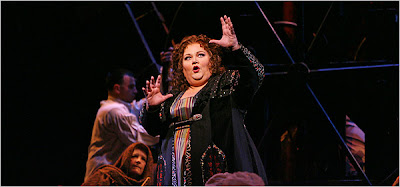

This production of Piero Foggioni (also responsible for the set, costumes and lightning) premiered at the Met some twenty years ago, in 1990 with Luciano Pavarotti and Aprile Millo.
The shortest way to describe it would be to simply state that it looks like Zeffirelli, fells like Zeffirelli and probably even smells like Zeffirelli, yet is not from Zeffirelli. Or maybe he used an alias and nobody ever noticed.
This XIXth century opera is staged like in the XIXth century, with the ostensible glittering elements and the usual fireworks on stage (scene 2 of Act I), the primitive lightning (spotlights on the guy singing) and a predictable lack of acting directions of any kind (the storyboard probably looks like : "when singing, do not move at all cost and open your arms wide so that the audience can see how much effort you put into it - after all, this is about the music, not the theater").
The shortest way to describe it would be to simply state that it looks like Zeffirelli, fells like Zeffirelli and probably even smells like Zeffirelli, yet is not from Zeffirelli. Or maybe he used an alias and nobody ever noticed.
This XIXth century opera is staged like in the XIXth century, with the ostensible glittering elements and the usual fireworks on stage (scene 2 of Act I), the primitive lightning (spotlights on the guy singing) and a predictable lack of acting directions of any kind (the storyboard probably looks like : "when singing, do not move at all cost and open your arms wide so that the audience can see how much effort you put into it - after all, this is about the music, not the theater").
So let's focus on the music.
Gianandrea Noseda's conduction was not very impressive, mostly in the lineage of Carlo Maria Giulini (whose approach of Verdi I've never liked): lacking fluidity and lightness. Angela M.Brown did not shine either as Amelia, and Salvatore Licitra has never been spectacular anyway (although he sounded way better than in last's year broadcast of Cav/Pag), especially because his high notes are always somehow on the brink of failure - but his low and middle registers were quite good indeed.
Dmitri Hvorostovsky had breathing issues in the first act, ending every replica with a very unelegant and guttural growl. All was forgotten by act II though, and his true vocal abilities were unleashed. And what a joy it is to hear Hvoro at his best.
Stephanie Blythe was the real star of the evening, as her performance as fortune-teller Ulrica was well-worth the evening.
Gianandrea Noseda's conduction was not very impressive, mostly in the lineage of Carlo Maria Giulini (whose approach of Verdi I've never liked): lacking fluidity and lightness. Angela M.Brown did not shine either as Amelia, and Salvatore Licitra has never been spectacular anyway (although he sounded way better than in last's year broadcast of Cav/Pag), especially because his high notes are always somehow on the brink of failure - but his low and middle registers were quite good indeed.
Dmitri Hvorostovsky had breathing issues in the first act, ending every replica with a very unelegant and guttural growl. All was forgotten by act II though, and his true vocal abilities were unleashed. And what a joy it is to hear Hvoro at his best.
Stephanie Blythe was the real star of the evening, as her performance as fortune-teller Ulrica was well-worth the evening.
The old atmosphere at the Met:
- gold curtain
- curtain call at the end of every act






No comments:
Post a Comment